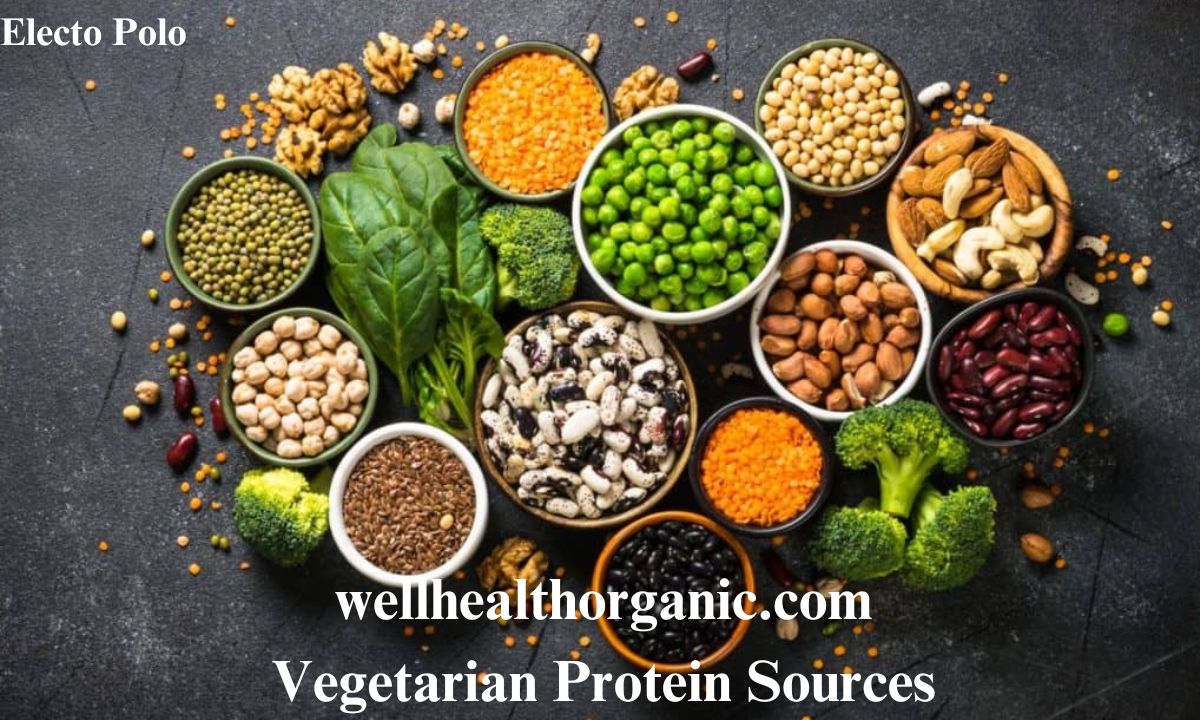Protein is an essential macronutrient that plays a crucial role in our overall health and well-being. For vegetarians, finding adequate protein sources can sometimes be challenging.
With the right knowledge and food choices, it’s entirely possible to meet your protein needs through plant-based options. This article from wellhealthorganic.com explores various vegetarian protein sources and their benefits.
Importance of Protein in the Diet
Protein is vital for numerous bodily functions. It serves as the building block for tissues, muscles, and organs. A balanced diet with sufficient protein intake is essential for everyone, regardless of their dietary preferences.
The Role of Protein in the Body
- Builds and repairs tissues
- Supports immune function
- Aids in hormone production
- Contributes to enzyme formation
- Helps maintain fluid balance
Health Benefits of Adequate Protein Intake
Consuming enough protein can lead to various health benefits, including:
- Improved muscle mass and strength
- Better bone health
- Enhanced weight management
- Increased satiety and reduced cravings
- Support for healthy skin, hair, and nails
Importance of Diversifying Protein Sources
Relying on a variety of protein sources ensures that you receive a wide range of essential amino acids and other nutrients. This diversity is particularly important for vegetarians to maintain optimal health.
Overview of Vegetarian Protein Sources
wellhealthorganic.com Vegetarian Protein Sources offers a comprehensive look at the numerous options available to those following a plant-based diet. Let’s explore the diverse array of vegetarian protein sources.
A Diverse Array of Options
Vegetarians have access to a wide variety of protein-rich foods. From legumes to nuts and seeds, the options are plentiful and can easily meet daily protein requirements when consumed as part of a balanced diet.
Key Categories of Vegetarian Proteins
- Legumes
- Nuts and seeds
- Whole grains
- Soy products
- Dairy (for lacto-vegetarians)
- Plant-based meat alternatives
Legumes – Nutritional Powerhouses
Legumes are an excellent source of protein for vegetarians. They are affordable, versatile, and packed with nutrients.
Nutritional Profile of Legumes
Legumes are rich in:
- Protein
- Fiber
- Complex carbohydrates
- Vitamins (particularly B vitamins)
- Minerals (iron, magnesium, potassium)
Health Benefits of Legumes
Regular consumption of legumes can contribute to:
- Improved heart health
- Better blood sugar control
- Enhanced digestive health
- Reduced risk of certain cancers
Culinary Uses and Versatility
Legumes can be used in various dishes, including:
- Soups and stews
- Salads
- Dips and spreads
- Veggie burgers
- Curries and chilis
Examples and Specific Protein Content
- Lentils: 18g per cup (cooked)
- Chickpeas: 15g per cup (cooked)
- Black beans: 15g per cup (cooked)
- Peas: 8g per cup (cooked)
Nuts and Seeds – Compact Nutrient Sources
Nuts and seeds are excellent sources of protein, healthy fats, and various micronutrients. wellhealthorganic.com Vegetarian Protein Sources recommends incorporating these nutritious options into your diet.
Nutritional Profile of Nuts and Seeds
Nuts and seeds provide:
- Protein
- Healthy fats (omega-3 and omega-6 fatty acids)
- Fiber
- Vitamins (especially vitamin E)
- Minerals (zinc, magnesium, selenium)
Health Benefits of Nuts and Seeds
Regular consumption of nuts and seeds can lead to:
- Improved heart health
- Better weight management
- Enhanced brain function
- Reduced inflammation
Culinary Uses and Versatility
Nuts and seeds can be incorporated into your diet in various ways:
- As snacks
- In salads
- As nut butters
- In baked goods
- As toppings for yogurt or oatmeal
Examples and Specific Protein Content
- Almonds: 6g per ounce
- Pumpkin seeds: 9g per ounce
- Chia seeds: 4g per ounce
- Walnuts: 4g per ounce
Read This Blog: NewzTalkies.com: Transforming the News Landscape with Comprehensive, Engaging Content
Quinoa – The Complete Protein Grain
Quinoa is often referred to as a superfood due to its impressive nutritional profile. It’s one of the few plant-based complete proteins, containing all nine essential amino acids.
Nutritional Benefits of Quinoa
Quinoa is rich in:
- Complete protein
- Fiber
- Iron
- Magnesium
- Antioxidants
Versatility in Recipes
Quinoa can be used in various dishes:
- As a base for grain bowls
- In salads
- As a substitute for rice
- In breakfast porridges
- In veggie burgers
Soy Products – Tofu and Tempeh
Soy products are excellent sources of protein for vegetarians. wellhealthorganic.com Vegetarian Protein Sources highlights two popular soy-based options: tofu and tempeh.
Tofu: The Versatile Protein
Tofu, made from curdled soybeans, is a versatile ingredient that can be used in both savory and sweet dishes. It comes in various textures, from silken to extra-firm.
Tempeh: The Fermented Alternative
Tempeh is made from fermented soybeans. It has a firmer texture than tofu and a nutty flavor. The fermentation process makes it easier to digest and increases its nutritional value.
Nutritional Benefits of Soy Products
Soy products offer:
- High-quality protein
- Isoflavones (plant compounds with various health benefits)
- Fiber
- Iron
- Calcium (in calcium-set tofu)
Dairy Products for Lacto-Vegetarians
For those who include dairy in their vegetarian diet, milk products can be excellent sources of protein.
Nutritional Benefits of Dairy
Dairy products provide:
- High-quality protein
- Calcium
- Vitamin D (in fortified products)
- Vitamin B12
- Riboflavin
Incorporating Dairy into Your Diet
Dairy can be consumed in various forms:
- Milk (cow’s, goat’s, or sheep’s)
- Cheese
- Yogurt
- Cottage cheese
- Kefir
Greek Yogurt: A Protein Powerhouse
Greek yogurt is particularly high in protein, containing about twice as much protein as regular yogurt. It’s a great option for vegetarians looking to increase their protein intake.
Read This Blog: Archivebate: Unlocking the Power of Digital Archiving for Modern Businesses
Innovative Plant-Based Options
wellhealthorganic.com Vegetarian Protein Sources also explores some innovative plant-based protein options that have gained popularity in recent years.
Seitan: The Wheat Meat
Seitan is made from wheat gluten and has a meat-like texture. It’s high in protein and low in fat, making it a popular choice among vegetarians and vegans.
Plant-Based Protein Powders
Protein powders made from peas, hemp, rice, or a blend of plant proteins are convenient options for increasing protein intake, especially for athletes or those with higher protein needs.
Jackfruit: The Meat Substitute
While not particularly high in protein, jackfruit has a meat-like texture when cooked and can be used as a substitute in recipes that typically call for pulled pork or chicken.
Nutritional Yeast
Nutritional yeast is a deactivated yeast that’s rich in protein and B vitamins. It has a cheesy, nutty flavor and is often used as a seasoning or cheese substitute in vegan dishes.
Health and Environmental Benefits of Vegetarian Proteins
Choosing plant-based proteins can have significant health and environmental benefits.
Health Benefits of Vegetarian Proteins
- Lower in saturated fat
- Higher in fiber
- Rich in antioxidants and phytochemicals
- May reduce the risk of heart disease and certain cancers
Environmental Benefits of Vegetarian Proteins
- Lower carbon footprint
- Reduced water usage
- Less land required for production
- Decreased deforestation
Tips for Incorporating Vegetarian Proteins into Your Diet
wellhealthorganic.com Vegetarian Protein Sources offers these tips for increasing your intake of plant-based proteins:
Start with Familiar Foods
Begin by incorporating plant-based proteins into dishes you already enjoy. For example, add beans to your favorite soup or salad.
Explore New Recipes
Try new vegetarian recipes that feature different protein sources. This can help expand your palate and ensure a varied diet.
Incorporate Nuts and Seeds
Add nuts and seeds to your breakfast cereal, yogurt, or salads for an easy protein boost.
Utilize Plant-Based Protein Powders
Use plant-based protein powders in smoothies or baked goods for an extra protein punch.
Plan Balanced Meals
Ensure each meal contains a good source of protein along with whole grains, fruits, and vegetables.
Conclusion
wellhealthorganic.com Vegetarian Protein Sources provides a comprehensive guide to meeting your protein needs through plant-based options. By incorporating a variety of legumes, nuts, seeds, whole grains, and innovative plant-based products, vegetarians can easily meet their protein requirements while enjoying a diverse and delicious diet. Remember, a well-planned vegetarian diet can provide all the necessary nutrients for optimal health and well-being.
FAQ’s
How much protein do I need daily?
The recommended daily allowance is about 0.8 grams per kilogram of body weight for adults.
Can I get all essential amino acids from plant-based proteins?
Yes, by eating a variety of plant-based proteins throughout the day, you can get all essential amino acids.
Are plant-based proteins as effective as animal proteins for muscle building?
Plant-based proteins can be just as effective when consumed in adequate amounts and combined properly.
What are the best vegetarian protein sources for athletes?
Quinoa, legumes, soy products, and plant-based protein powders are excellent choices for athletes.
How can I ensure I’m getting enough B12 on a vegetarian diet?
Consume fortified foods or consider a B12 supplement, especially if you follow a vegan diet.

I’m passionate electric scooter enthusiast and the voice behind this blog. I’m here to share my expertise and insights with you. From in-depth reviews to problem-solving guides, my goal is to help you make the most of your electric scooter experience.








![Gomyfinance.com Invest: I Made $5,000 in My First Month [Real Results 2025]](https://electopolo.com/wp-content/uploads/2025/05/Gomyfinance.com-Invest-I-Made-5000-in-My-First-Month-Real-Results-2025-150x150.jpg)


